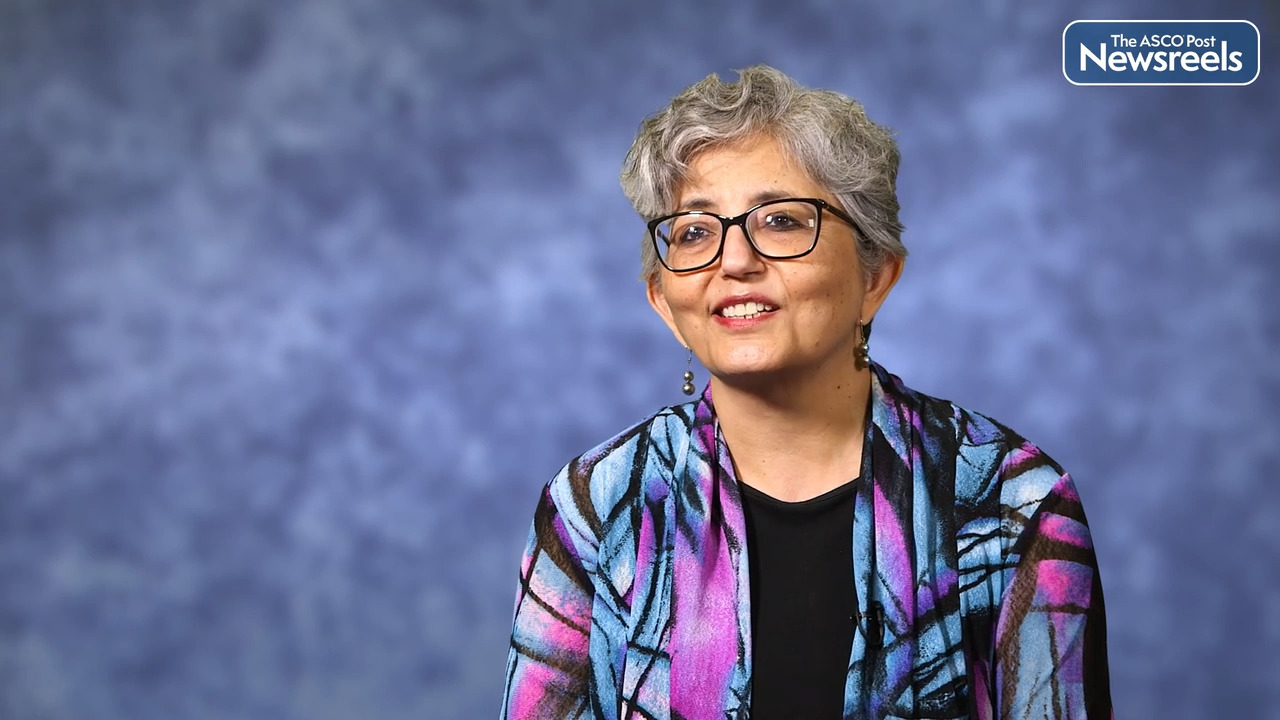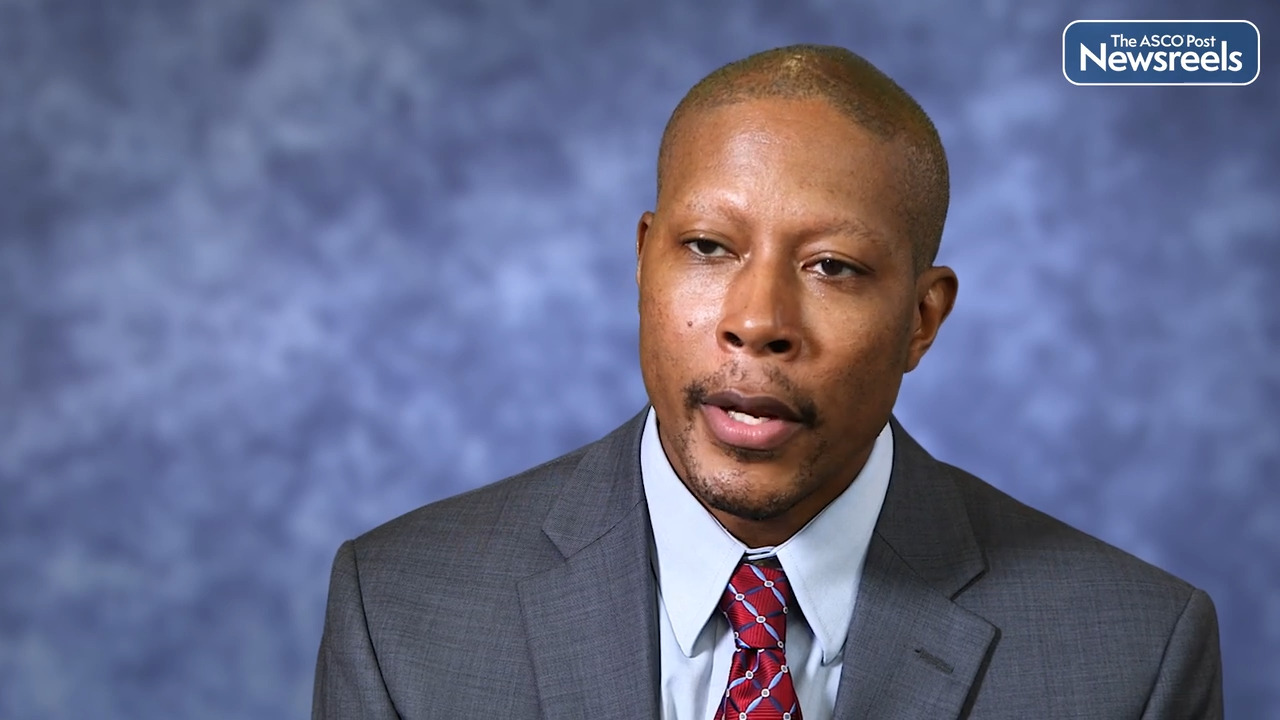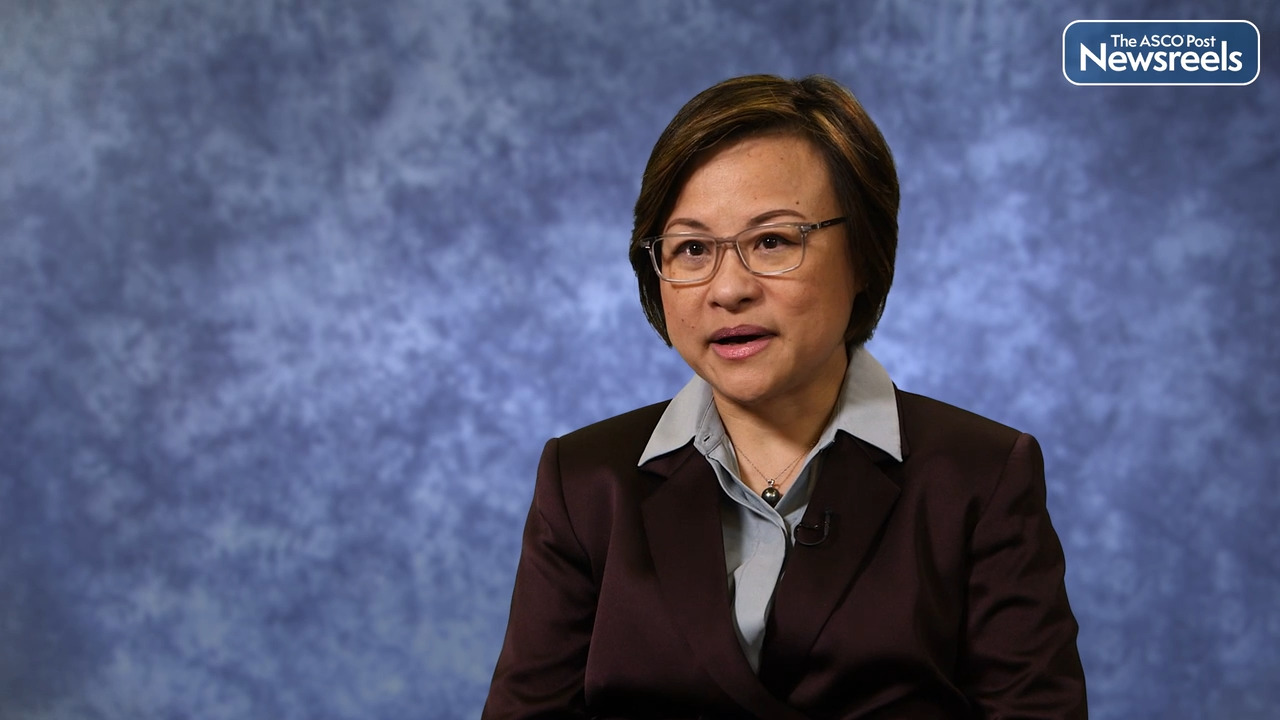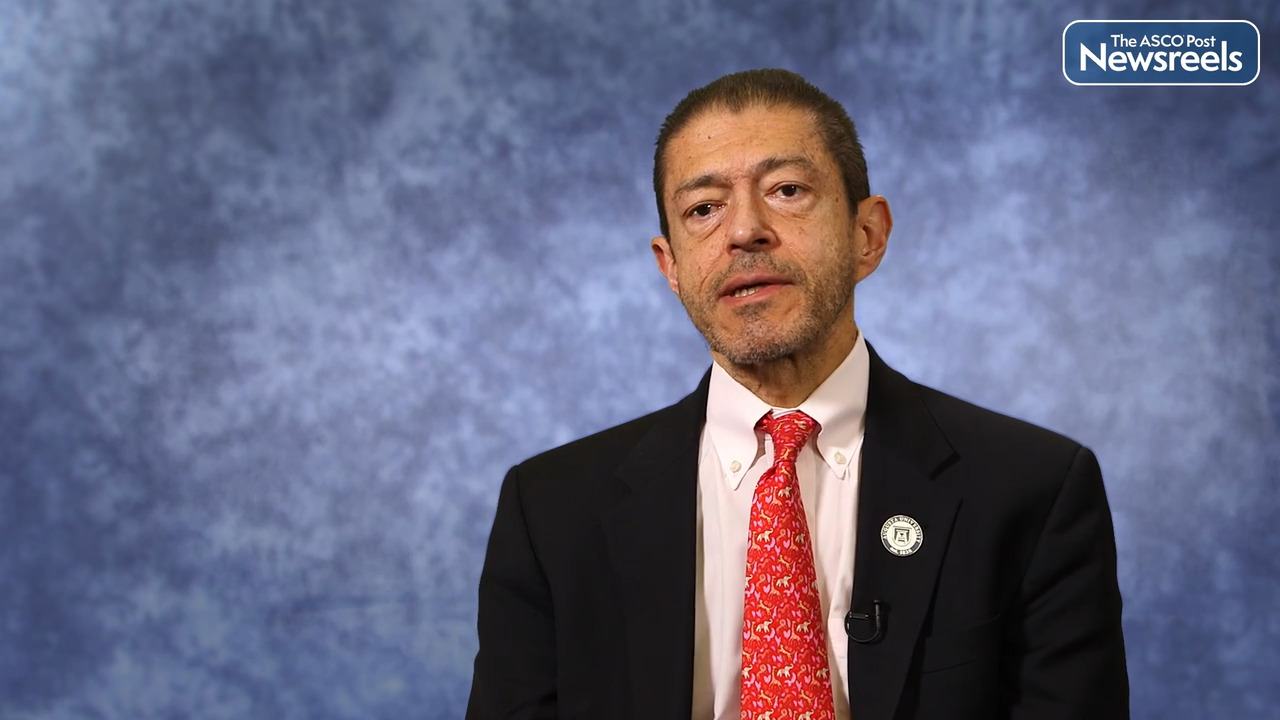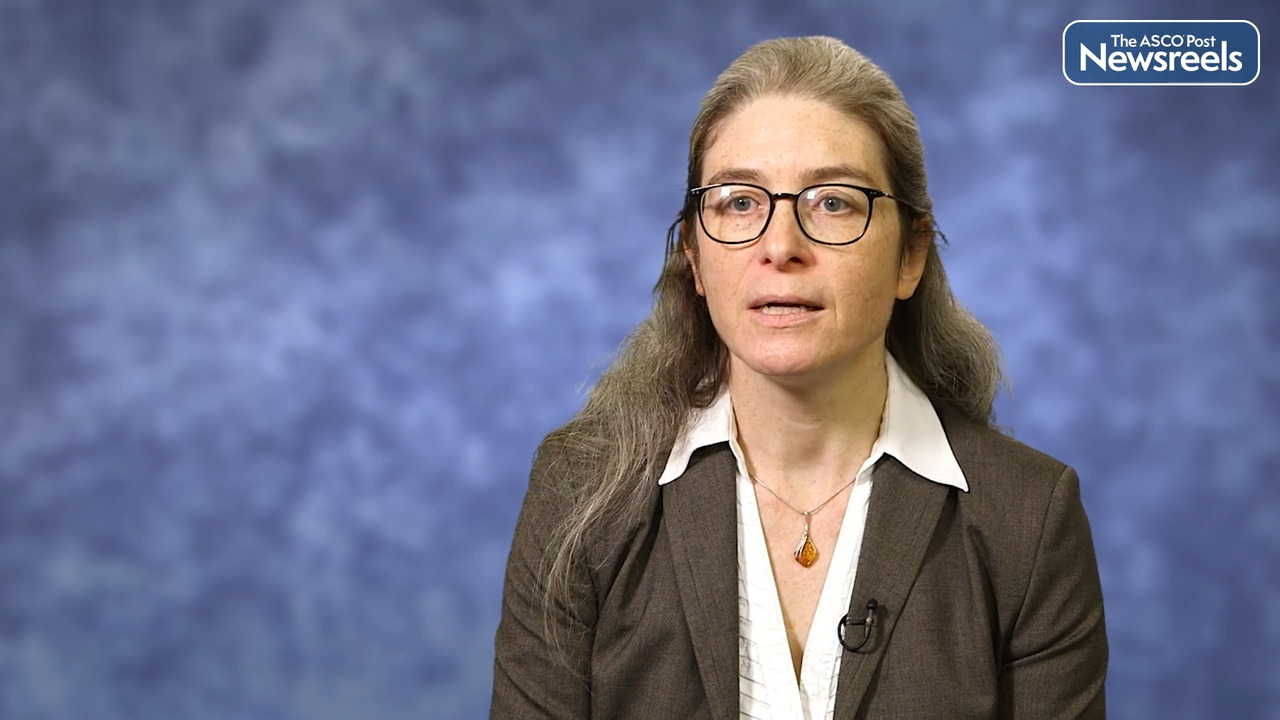Mark R. Litzow, MD, on ALL: Consolidation Therapy With Blinatumomab Improves Overall Survival
2022 ASH Annual Meeting and Exposition
Mark R. Litzow, MD, of the Mayo Clinic, discusses phase III results from the ECOG-ACRIN E1910 Trial, which show that adding blinatumomab to consolidation chemotherapy resulted in a significantly better overall survival in adult patients aged 30 to 70 years with newly diagnosed B-lineage acute lymphocytic leukemia (ALL) who were measurable residual disease–negative after receiving intensification chemotherapy. The authors believe this may represent a new standard of care for this population (Abstract LBA-1).
Transcript
Disclaimer: This video transcript has not been proofread or edited and may contain errors.
Blinatumomab is a bispecific T-cell engager molecule that's been approved by the Food and Drug Administration for patients with relapsed and refractory B-lineage, acute lymphoblastic leukemia. And then more recently was approved for the treatment of patients who have measurable residual disease or MRD positive acute lymphoblastic leukemia. The aim of our study was to see if adding blinatumomab to chemotherapy had benefit for patients with MRD negative disease, who we overall think have a better prognosis. The design of the trial was to take patients between the ages of 30 and 70 with B-lineage ALL and newly diagnosed, and give them induction chemotherapy, standard chemotherapy, to get them into remission. Patients who achieved a conventional morphologic remission then had a cycle of intensification therapy to provide prophylaxis for their central nervous system. After that treatment, then they had a bone marrow biopsy and we assessed their MRD status by flow cytometry in a centralized lab.
And patients that were MRD negative at that point were then randomized to either get four cycles of consolidation chemotherapy, followed by one to two years of maintenance chemotherapy or get randomized to receive that same four cycles of chemotherapy, but also have four cycles of blinatumomab intertwined with the cycles of chemotherapy. Patients who are randomized to blinatumomab plus chemotherapy, received two monthly cycles of blinatumomab, recall that that's given by continuous infusion for four weeks. They then got several more cycles of the consolidation chemotherapy, then got another cycle of blinatumomab, then the fourth cycle of consolidation chemotherapy, and then another cycle of blinatumomab, and then went on to maintenance therapy.
And the goal of the study was to see if we could improve their overall survival. We enrolled 488 patients in the trial. 81% of those patients achieved a conventional morphologic complete remission. Some of them unfortunately relapsed shortly after that or had to be taken off study because of toxicity. But at the randomization for the MRD negative patients, we were able to randomize 224 patients, so 112 patients to each of the two arms, the chemotherapy alone or the chemotherapy plus blinatumomab.
And what we found was that the survival was much improved with blinatumomab and chemotherapy arm. And this was based on less relapses in that arm. Even though these patients are MRD negative, we know that they can still relapse and could still have residual disease. At three and a half years of follow up, the survival in blinatumomab plus chemotherapy arm was 83% versus 65% in the patients who got chemotherapy, and this was from the time of randomization.
We also showed a benefit for relapse-free survival as well. We're very excited about these results. We think they represent a new standard of care and that blinatumomab should be considered to be added to consolidation chemotherapy for patients for standard of care. We are discussing now how to build on these studies. We think that adding blinatumomab earlier in the treatment course may be beneficial, and there are studies that are beginning to look at that. We're also incorporating this into the other new modalities of therapy that you all are aware of, that are involved in the treatment of B-lineage ALL.
The ASCO Post Staff
Smita Bhatia, MD, MPH, of the Institute for Cancer Outcomes and Survivorship, University of Alabama at Birmingham, discusses study findings that showed key somatic mutations in the peripheral blood stem cell product increases the risk of developing therapy-related myeloid neoplasms (Abstract 119).
The ASCO Post Staff
Tycel J. Phillips, MD, of the City of Hope National Medical Center, discusses data that showed fixed-duration glofitamab monotherapy induced high and durable complete response rates in patients with mantle cell lymphoma (MCL) who received obinutuzumab pretreatment. This is one of the largest data sets and longest follow-ups reported with a CD20/CD3 bispecific monoclonal antibody for patients with relapsed or refractory MCL (Abstract 74).
The ASCO Post Staff
Jia Ruan, MD, PhD, of Meyer Cancer Center, Weill Cornell Medicine, and NewYork-Presbyterian Hospital, discusses trial results demonstrating that the triple chemotherapy-free combination of acalabrutinib, lenalidomide, and rituximab is well tolerated, highly effective, and produces high rates of minimal residual disease (MRD)-negative complete response as an initial treatment for patients with mantle cell lymphoma, including those with TP53 mutations. Real-time MRD analysis may enable treatment de-escalation during maintenance to minimize toxicity, which warrants further evaluation. An expansion cohort of acalabrutinib/lenalidomide/obinutuzumab is being launched (Abstract 73).
The ASCO Post Staff
Jorge E. Cortes, MD, of Georgia Cancer Center at Augusta University, discusses new findings on vodobatinib, which was administered to patients with chronic-phase Philadelphia chromosome–positive chronic myeloid leukemia (CML) and appeared to be efficacious and safe in people who had received therapy with two or three prior tyrosine kinase inhibitors (TKIs). Vodobatinib remains a potential option for these highly refractory patients. A phase II study (NCT02629692) of vodobatinib is ongoing in CML patients whose disease has failed to respond to three or more TKIs, including ponatinib (Abstract 84).
The ASCO Post Staff
Eva Hoster, PhD, of Munich University, discusses results from the European MCL Elderly Trial, which confirmed the strong efficacy of rituximab maintenance in minimal residual disease (MRD)-negative patients with mantle cell lymphoma (MCL) after induction. Omitting maintenance based on MRD-negativity is thus discouraged. Considering the short time to progression, more effective treatment strategies should be explored in MRD-positive patients to improve long-term prognosis (Abstract 544).
